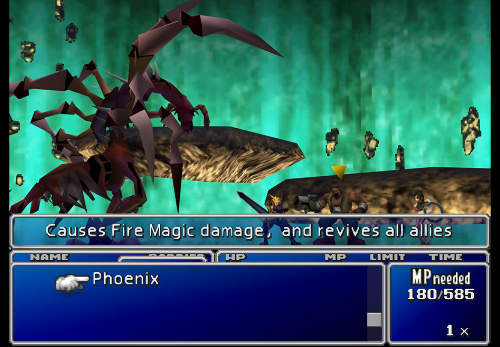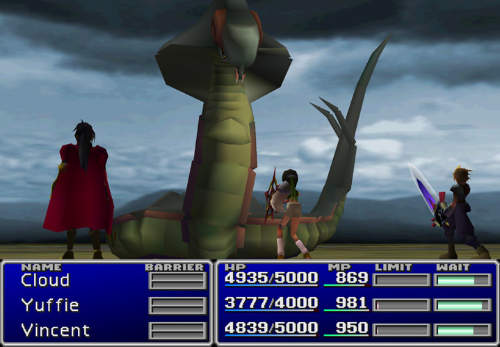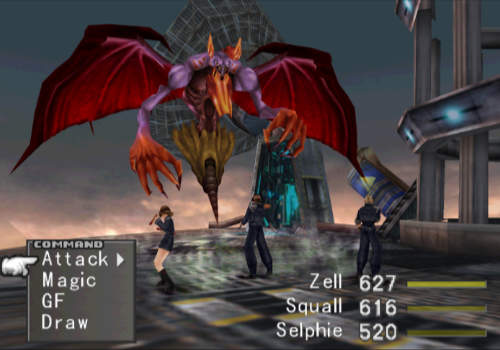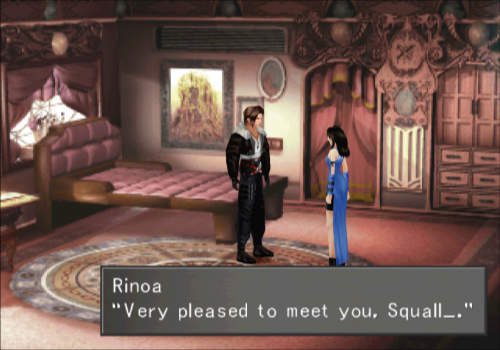As the sun set on the SNES era, a new breed of Final Fantasy was unleashed upon the world, the first to feature full 3D graphics. These new games would bring Final Fantasy newfound fame outside of Japan in particular, but their impact was felt even at "home." Ladies and Gentlemen, welcome to the PlayStation era!

Final Fantasy VII Key Art
As I sat down to write about my views on Final Fantasy VII, I found myself at an impasse. What could I possibly write about this game that hasn't already been said a million times over? Final Fantasy VII is considered to be the greatest entry in the series, and for very good reasons. It brought the series and RPGs in general into the mainstream eye, boasting amazing graphics (for the time), an intense and well designed battle system, and a captivating story with multiple twists that are still talked about decades later. This game alone made the PlayStation a must-have system for gamers around the world. But how does it fare compared to today's standards?
Let's get the obvious out of the way first. The graphics have definitely not aged well, and frankly, I don't hold it against the game. 1997 was a very experimental time for games, with 3D design being a rather new idea. The characters' designs are clunky on the world map, but they still retain unique elements that help to establish who these people are. What I find interesting is how the character models actually change when entering combat. On the world map, characters are short and exaggerated, but in battle, their designs change to more realistically-proportioned models, detailing the characters in rather intricate ways. These battle models even display different designs depending on which weapons a character has equipped, something that even some modern games don't spend resources to render.
Battles retain the classic ATB system, though new elements are introduced, such as changing the party to a three man team and introducing the now famous Materia system. When compared to later gameplay elements like FFX's Sphere Grid and FFXII's License Board, I'm not the biggest fan of the Materia system. When I was a child, I didn't fully understand it, and even now my grasp of it isn't much better. It's cool that the Materia system allows you to build the characters however you want, but I like having a more restricted system. I feel it really gives the playable characters an extra element of uniqueness when they focus on a single class, such as a magic caster or a fighter. I'll admit, it's a great first step for battle systems featured in later games, and mayhap I simply didn't utilize Materia properly, but for me? I could have lived without having to use Materia.
Final Fantasy VII Screenshots
Where Final Fantasy VII really shines is in its cast and story. The game features by far one of the most unique casts in the series. We have Cloud, our hero, who's an ex-SOLDIER with a bit of a memory problem; joining him are a couple of eco-terrorists a flower girl, a talking Cat/Dog/Wolf hybrid, a giant puppet, a pilot, a ninja, and a freaking vampire (more or less). These characters are all unique in design and personality, each one bringing something new and interesting to the party's dynamic. These characters are so popular that multiple elements of their designs have been featured in numerous games. Hell, I think Cloud's Buster Sword shows up in more games than Cloud himself!
I love the story of Final Fantasy VII, though I feel that time has somewhat robbed it of its shock and value. The death of Aerith is on par with Darth Vader being Luke's father when it comes to spoilers, which is to say that it's a twist known by most people. It's unfortunate that Final Fantasy VII's popularity tends to rob people of this moment's value, but this raises another question for me. With Final Fantasy VII being so popular and its story so well known, is it worth it to play through the game in this day and age? That depends; does Star Wars become a worse movie once you know how it ends? Does Lord of the Rings lose its luster after being read for the first time? Simply put, Final Fantasy VII is one of the most popular entries in the Final Fantasy series for a good reason. While it has flaws and dated mechanics, what it does well, it does very well. Its story, characters, and gameplay wrap together to form a strong package, earning it a rightful place in the halls of RPG greatness.

Final Fantasy VIII Art - Squall and Rinoa
Final Fantasy VIII is a strange game to me. Not bad, like a certain entry I refuse to discuss further, but strange. On the outside, Final Fantasy VIII seems similar enough to previous entries, featuring an immersive story and colorful cast of characters. But when it comes to gameplay, Final Fantasy VIII falls far from the tree. For those unfamiliar with this entry, let me break it down for you. Final Fantasy VIII relies heavily on the Junction system, which replaces the traditional magic and leveling up systems seen in previous games. Rather than learning abilities and spells through leveling up, the party has to "Draw" magic from enemies with the help of Guardian Forces, the term used for summons in VIII. By drawing, characters gain spells that can either be used to cast magic or refined into stat boosting abilities, though the stats that can be gained depend on the Guardian Force connected to the character. Leveling up a character only provides minimal stat increases, so to have truly powerful characters, Junctioning is an absolute necessity.
This brings me to my next topic. Minus a few specific areas, every enemy and boss is scaled to the party's level, ensuring that there's always a sense of difficulty no matter what level the player is. This leads to the interesting possibility of a player being able to beat the game without gaining a single level, which is rather unprecedented in the Final Fantasy series. Personally, I'm not the biggest fan of the Junctioning system. At times, it can get more than a little repetitive, requiring players to grind for hours to fill up their spells and stats. It doesn't even feel all that rewarding compared to previous systems. Compared to say, Final Fantasy V, where I could level up separate jobs and reap the fruit of their rewards, I was just plain bored after constantly drawing and refining spells.
Final Fantasy VIII Screenshots
The story of Final Fantasy VIII is rather subpar when compared to previous entries. It starts off rather strong, following the exploits of Squall and the rest of his SeeD classmates, but towards the end it really jumps the shark and bends over backwards (yes, both) trying to explain some of its plot points. When it was revealed that all of the playable characters were orphans who knew each other, I actually laughed out loud at the ridiculousness of the whole setup. I wasn't expecting a crazy epic tale, but still, the writing at times felt amateurish at best.
Before I started this endeavor, I was really expecting Final Fantasy VIII to be the worst in the series. Fortunately, Final Fantasy II holds that top honor, so where does that leave Final Fantasy VIII in my heart? It's by far one of the weaker entries in the series, but I have to give Square props for trying something so experimental. While it may have fallen flat in my eyes, innovation like this is what builds the future of video games.
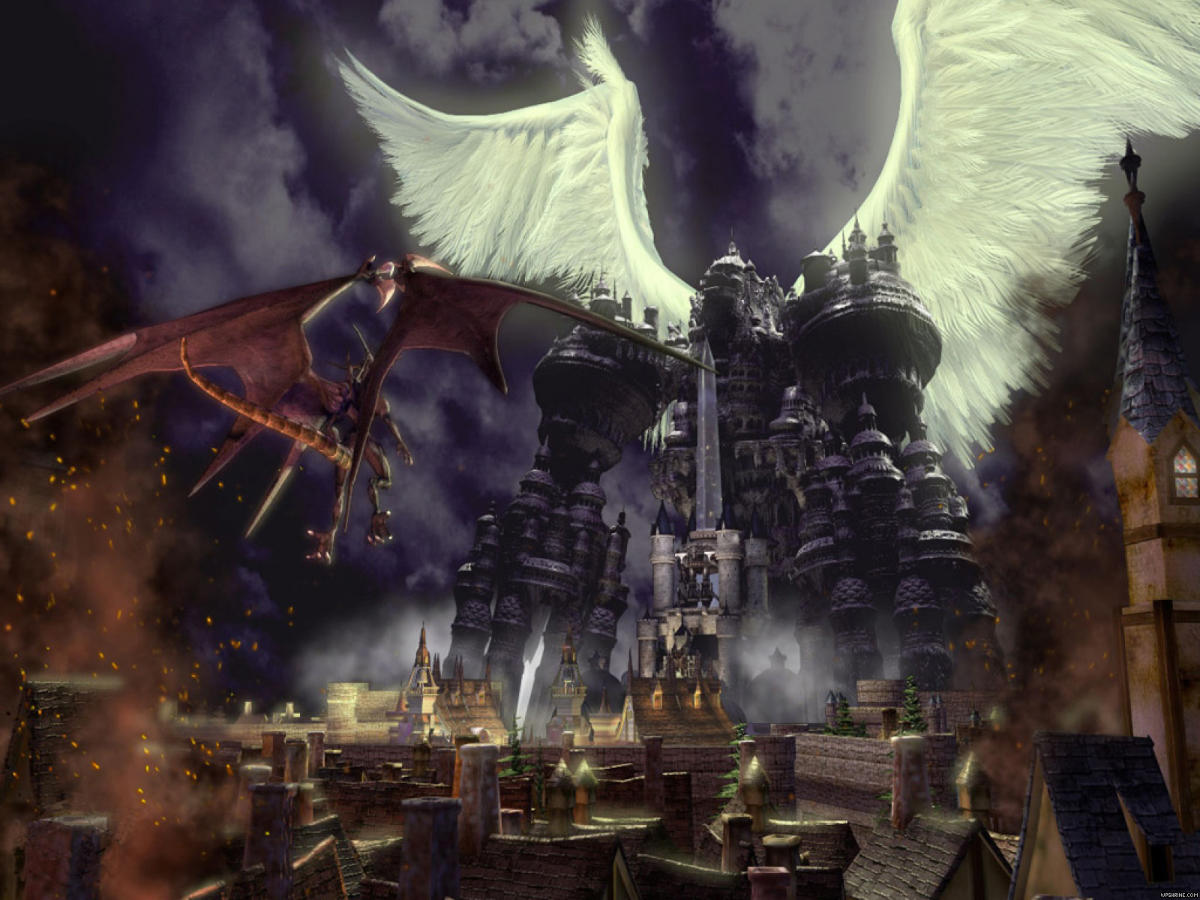
Final Fantasy IX Art - Bahamut vs. Alexander
Before I get started with this section, I'd like to take a moment to plug episode 109 of Retro Encounter, where myself and fellow staff members Alana Hagues and Stephanie Sybydlo gush about our love for Final Fantasy IX. Make sure to give it a listen!
As I've stated many times before, Final Fantasy IX was the first RPG I ever played, and it held a special place in my heart even before I replayed it for this article. To say I love this game is a massive understatement. Within this section, I'm going to do my best to convey why Final Fantasy IX is, beyond a shadow of a doubt, the best Final Fantasy.
Final Fantasy IX has one of the best battle systems in the series, perfectly encapsulating the feel of classic Final Fantasy while also presenting new elements to the formula. The biggest example of this is the new ability system, wherein skills, spells, and abilities are acquired through specific equipment. For example, Vivi, the resident Black Mage of Final Fantasy IX, doesn't learn any of his basic magic skills through leveling up. Instead, he needs to equip specific staves, gear, and accessories to learn his abilities. This adds an interesting element to battle, requiring players to look beyond gear stats, and instead pick equipment that grants necessary skills. Of course, after fighting with that gear for awhile, party members will permanently learn those skills, making mid-game play an exciting time. I will admit, however, that battles do tend to run a bit slower when compared to RPGs released in this day and age. Fortunately, with the recent re-releases of Final Fantasy IX on Steam and the PlayStation 4, this pain is alleviated thanks to the newly added "Speed Up" mode, allowing gamers to drastically increase the speed of battles and world map traversal.
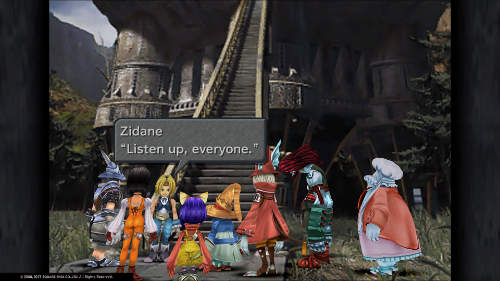
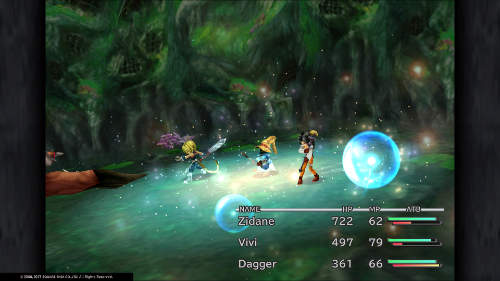
Final Fantasy IX Screenshots
The story of Final Fantasy IX is one of the best I've experienced in a video game. Presenting a rather cute and fantastical exterior, Final Fantasy IX's story is filled with strife, loss, and a pondering on what it means to be a family. Death is an ever present theme throughout the story, along with a general sense of loneliness and unease. Each character in the party has an underlying sadness to them, whether it be Freya and her search for her long lost love, or Eiko and her crushing loneliness. And yet, despite all of these issues, these characters manage to fight past their flaws and come together to form a bond that no villain could break. No scene encapsulates this feeling better than Zidane's breakdown on Terra. After discovering his purpose for being created, Zidane succumbs to his sadness, abandoning his normally carefree attitude. It's only with the help of his friends that Zidane manages to fight past his oppressive despair and come out at the end stronger than ever before. If you haven't had the chance to see this scene before, I highly recommend you look it up! Or better yet, purchase the game and experience it for yourself! Even after all these years, it's still as powerful as the first time I witnessed it.
Honestly, I could've written an entire feature just on Final Fantasy IX, but for brevity's sake, I'll end it here. If you've yet to play Final Fantasy IX, you're truly missing out on a magical experience. Its story, gameplay, and even design remain strong to this day. I can't recommend this game enough, and without a doubt, it still remains my all time favorite game to this day.
< Return to Feature Hub

